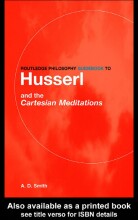Summary: Routledge Philosophy Guidebook To Husserl And The Cartesian Meditations | 9780415287586 | A D Smith, et al
- This + 400k other summaries
- A unique study and practice tool
- Never study anything twice again
- Get the grades you hope for
- 100% sure, 100% understanding
Read the summary and the most important questions on Routledge Philosophy Guidebook to Husserl and the Cartesian Meditations | 9780415287586 | A. D. Smith; Arthur David Smith
-
0 Inleiding
This is a preview. There are 4 more flashcards available for chapter 0
Show more cards here -
What kind of enterprise is phenomenology according to Husserl
A communal enterprise. It would proceed by a critical interchange of views. -
What does Husserl mean with the statement that transcendental phenomenology is the secret longing of all genuine earlier philosophy?
It is the final breakthrough to a realization of the idea that governed philosophy since the Greeks. -
What does Husserl mean with idea?
It is aregulative idea(cfr Kant): one thatpoints us forward in anenterprise that can haveno final ,finite completion , though we have adefinite recognition ofprogress ; anideal . -
Why is true philosophizing(the transcendental phenomenological perspective) an unnatural activity?
Normally we areconcerned withobjects in theworld , determining theirproperties and their reality. In thismode ofliving we are 'given over' ordedicated ' to theworld . All ourconcerns are 'objectively 'directed . We need a switch of interest, away from the world, and towards our own conscious life in which such a world presents itself to is. -
What does Husserl mean with 'primal establishment' or 'primal institution' of philosophy?
An idea that is the idealconception ofgenuine science asuniversal knowledge . Universal in two senses: reality astotality andscience should begrounded in anddeveloped throughabsolute insight and henceabsolutely justified -
Relation of primal establishment/institution' and philosophy?
Philosophy should be asecure method leading toabsolute succes in each of itsstep towards the 'final establishment '.Transcendental philosophy does thisjob . -
Role of philosophy in the sciences?
Only with the systematic unity of philosophy can various sciences develop into genuine sciences. The idea of a systematic enquiry into universally valid truth comes first; any 'positive' science is but a regional application of this philosophical perspective to a particular domain of reality. -
The apodictic idea of Descartes?
THe existence of a conscious subject for himself. -
1 First Meditation
This is a preview. There are 25 more flashcards available for chapter 1
Show more cards here -
Why is Husserl mad at Descartes?
Descartes tries to prove the existence of an external world on the basis of inner experience, which is nonsens. He discovered a transcendental perspective in his first two meditations, but abandoned it. -
What deas Husserl mean with Urdoxa?
That certainty which is the primary and primal 'position' of our cognitive lives, which can only be modified, or 'modalized'(which are local), and that only one way - by some disharmony or conflict entering our experience
- Higher grades + faster learning
- Never study anything twice
- 100% sure, 100% understanding
































